Last Updated: 4 February 2026
Poker Hand Rankings: Complete Guide with Probabilities and Odds
Discover the complete poker hand rankings, with odds and probabilities for each hand, from Royal Flush to High Card, to improve your game strategy.
GuidesPoker hand rankings are an essential piece of knowledge for any poker player. Fortunately, learning them is quite simple and won’t take too much of your precious time. We will teach you how different hands are ranked in poker, what hand beats what others, and how different poker hands are made.
A poker deck has 52 cards, but each poker hand is made up of exactly five cards. You will have a total of seven cards at your disposal to make your five-card hand, which includes your two hole cards and the five community cards.
Let’s get started and take a look at the different poker hands out there and how they are ranked.
Download Poker Hand Rankings Chart: Free PDF
Having the poker hand rankings available to you at all times can be very useful when just starting out in poker. Download our free poker hand rankings PDF for an easy-to-read chart you can take with you anywhere.
Our poker hand rankings chart is a small file you can download to PCs or phones and open at any time if you have a dilemma. This is a must-have cheat sheet for beginner poker players, but keep on reading to find out more about the different poker hands and their rankings.
Poker Hand Rankings from Best to Worst
Texas Hold’em Poker, like most other poker games, is played with a deck of 52 playing cards. The deck contains cards in four suits, with 13 ranks of each card. The deuce is the lowest card in the deck, and the ace is the highest.
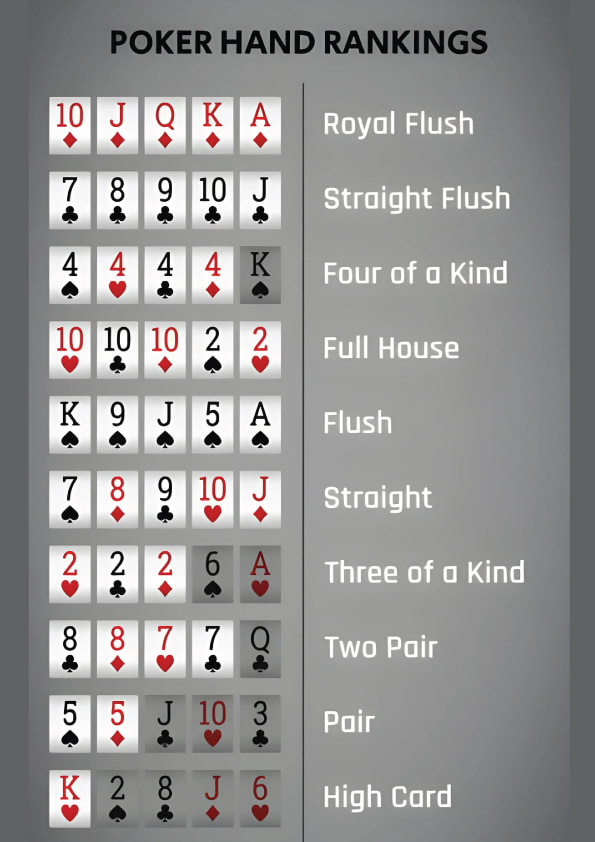
It is worth noting that the ace can act as both a low and a high card for the purposes of making a straight but is a high card for all other purposes. All other cards are ranked in the typical order, with the number of pips on the card determining its value. Jacks, queens, and kings rank above the 10 and other lower cards, while the ace trumps them all.
The four suits in the poker deck each have the exact same value. Players can make flushes and straight flushes in each suit, and their value is determined by the high card rather than the flush suit. The joker cards are taken out of the deck before the game begins and are not a part of the game of Texas Hold’em Poker.
Official Poker Hand Rankings
Here are the official poker hand rankings for Texas Hold’em, from the strongest hand to the weakest. Also in this table, you’ll find the probability of making that hand at any stage in two popular online poker games (Texas Hold’em and Omaha).
| Hand | Example | Probability (Texas Hold’em) | Probability (Omaha) |
| Royal Flush | A♥ K♥ Q♥ J♥ 10♥ | 1 in 649,740 | 1 in 122,000 |
| Straight Flush | 9♣ 8♣ 7♣ 6♣ 5♣ | 1 in 72,193 | 1 in 10,200 |
| Four of a Kind | 4♠ 4♣ 4♦ 4♥ 9♥ | 1 in 4,165 | 1 in 694 |
| Full House | Q♠ Q♦ Q♣ 9♥ 9♦ | 1 in 694 | 1 in 156 |
| Flush | K♠ J♠ 8♠ 4♠ 2♠ | 1 in 508 | 1 in 118 |
| Straight | 10♦ 9♣ 8♥ 7♦ 6♠ | 1 in 254 | 1 in 51 |
| Three of a Kind | 7♣ 7♦ 7♥ 5♣ 2♦ | 1 in 47 | 1 in 19 |
| Two Pair | J♣ J♦ 8♣ 8♥ 4♦ | 1 in 21 | 1 in 4.5 |
| One Pair | 10♠ 10♦ 5♣ 3♥ 2♠ | 1 in 2.37 | 1 in 2.5 |
| High Card | A♣ 10♦ 7♠ 5♣ 3♥ | 1 in 1.99 | 1 in 2.1 |
These rankings determine the outcome of each poker hand, with the Royal Flush being the strongest hand and the High Card the weakest. A Royal Flush, the rarest and most unbeatable hand, occurs only once in about 649,740 hands in Texas Hold’em.
In contrast, a High Card hand, where no other hand is made, appears roughly every other hand. It’s also worth noting that the odds of hitting stronger hands are generally better in Omaha than in Texas Hold’em, due to players being dealt more cards, offering more potential combinations.
Let’s dive deeper into each poker hand combination, covering probabilities, examples, and what each poker hand beats.
Royal Flush (A♥ K♥ Q♥ J♥ T♥)
A Royal Flush is the strongest hand in poker. It is made up of the five highest-ranked cards of a single suit, for example: A♥ K♥ Q♥ J♥ 10♥. It is a very rare hand, and you will not come by it too frequently in your poker career. However, this hand cannot be beaten, so once you do make it, you can start counting the chips in the pot.
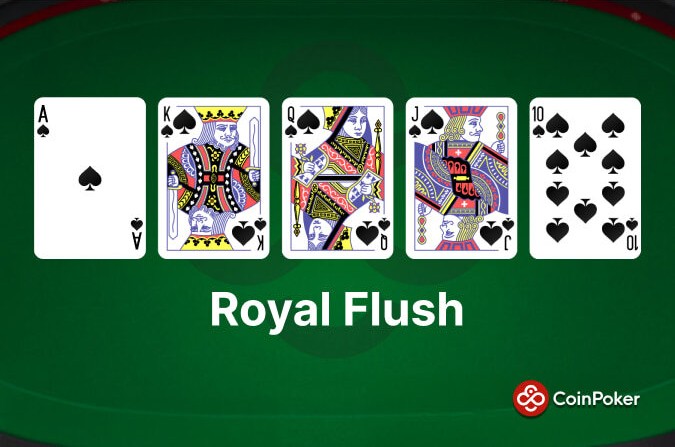
A Royal Flush beats every other hand in poker, including the Straight Flush. For example, if you hold A♥ K♥ Q♥ J♥ 10♥, your hand wins against a hand like Q♥ J♥ 10♥9♥8♥, which is a very strong poker hand in its own right.
Out of all your poker hands, only 1 in 649,740 will end up becoming a Royal Flush by the river.
| Stage of the Game | Texas Hold’em Odds | Omaha Odds |
| Odds of Hitting a Royal Flush on the Flop | 0.0008% (1 in 122,000) | 0.0015% (1 in 67,000) |
Straight Flush (8♠ 7♠ 6♠ 5♠ 4♠)
A Straight Flush is the second strongest hand in poker, with only a Royal Flush being higher in the poker hand rankings. This hand is made up of five consecutive cards of a single suit, such as 8♠ 7♠ 6♠ 5♠ 4♠. A Straight Flush comes your way once in a blue moon in Texas Hold’em and is a true poker powerhouse.
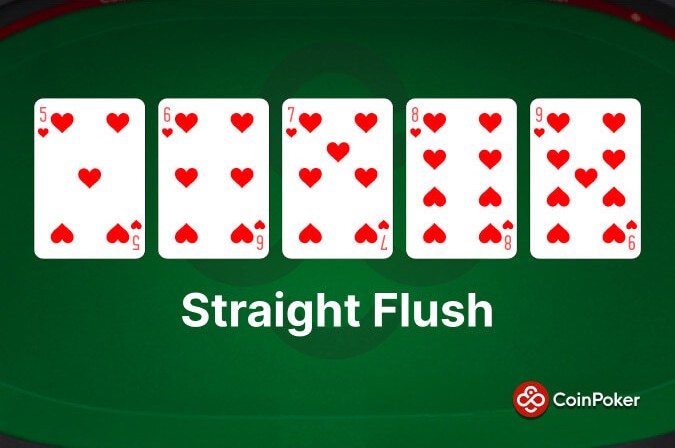
If you are dealt a Straight Flush, you can be pretty sure you have the winning hand. For example, 8♠ 7♠ 6♠ 5♠ 4♠ beats any Four-of-a-Kind or even a smaller Straight Flush like 6♠ 5♠ 4♠ 3♠ 2♠. The high end of a Straight Flush is always the best possible hand on any board in poker.
Only 1 in 72,193 poker hands turn into a Straight Flush by the river.
| Stage of the Game | Texas Hold’em Odds | Omaha Odds |
| Odds of Hitting a Straight Flush on the Flop | 0.02% (1 in 4,900) | 0.031% (1 in 3,200) |
Four-of-a-Kind (9♣ 9♦ 9♥ 9♠ A♣)
Four-of-a-Kind, also known as Quads, is a slightly more realistic poker hand to make in Texas Hold’em Poker. The hand is made up of four cards of the same ranking, along with one other card that acts as the kicker. For example: 9♣ 9♦ 9♥ 9♠A♣. It is the third-best hand in the poker hand rankings, and on most boards, it is the best possible hand, also known as the nuts.
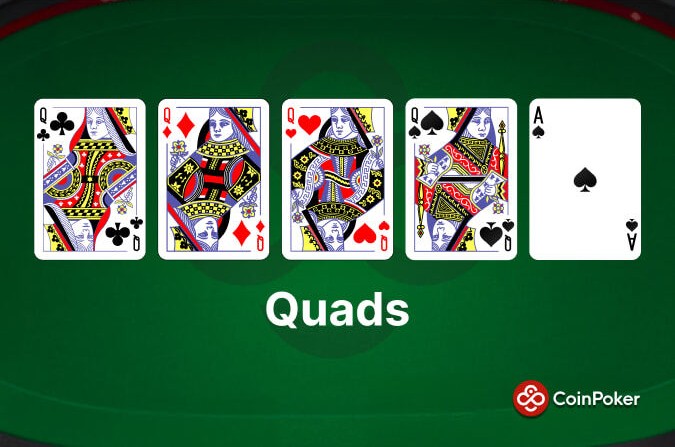
You will not make Quads too often, but the hand will allow you to beat a full house and all lower-ranked hands. Keep in mind that Quads can also lose to higher Quads, such as 9♣ 9♦ 9♥ 9♠ A♣ losing to J♣J♦ J♥ J♠ 7♣. Quads also lose to any Straight Flush or Royal Flush by default.
Only 1 in 4,165 Texas Hold’em hands become Quads, provided the hand goes all the way to the river.
| Stage of the Game | Texas Hold’em Odds | Omaha Odds |
| Odds of Hitting Four of a Kind on the Flop | 0.24% (1 in 416) | 0.40% (1 in 250) |
Full House (K♠ K♣ K♦ 5♠ 5♦)
A Full House in poker is one of the strongest poker hands you will get relatively often. It is made up of three cards of one ranking and two cards of another, such as: K♠ K♣ K♦ 5♠ 5♦. In layman’s terms, if you have Three-of-a-Kind plus One Pair, you hold a Full House. You make a Full House once in 694 hands, which makes it a much more common hand than the likes of a Straight Flush or Quads.
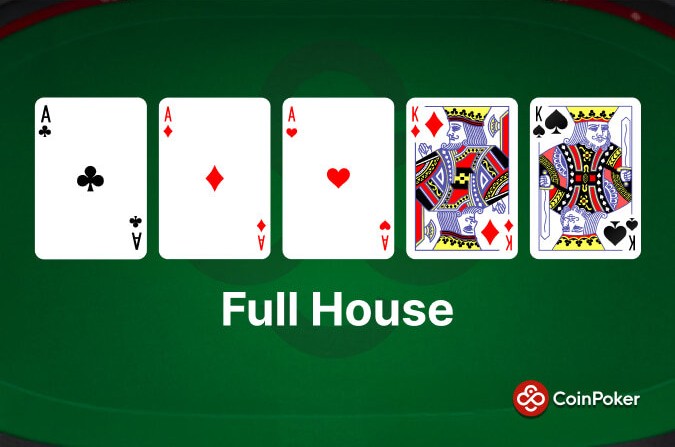
A Full House beats any Flush, Straight, or lower-ranked hand. On the other hand, a Full House automatically loses to Quads, a Straight Flush, or a Royal Flush. If two Full Houses go head-to-head, the one with the higher trips wins. For example, your K♠ K♣ K♦ 5♠ 5♦ would beat Q♦ Q♣ Q ♠A♦ A♠, but lose to A♠ A♦ A ♣ 2♣ 2♦, because three Kings beat three Queens, but lose to three Aces.
A Full House pops up every 1 in 694 hands of poker if all five community cards are revealed.
| Stage of the Game | Texas Hold’em Odds | Omaha Odds |
| Odds of Hitting a Full House on the Flop | 0.14% (1 in 694) | 0.20% (1 in 500) |
Flush (A♣ 10♣ 8♣ 5♣ 2♣)
A Flush in poker consists of five cards of the same suit in any order (e.g., A♣ 10♣ 8♣ 5♣ 2♣). Similar to a Full House, not all Flushes are created equal! A higher Flush always beats a lower Flush. The ranking of the Flush is determined by the highest card in the hand. A Flush also beats all lower-ranked poker hands.
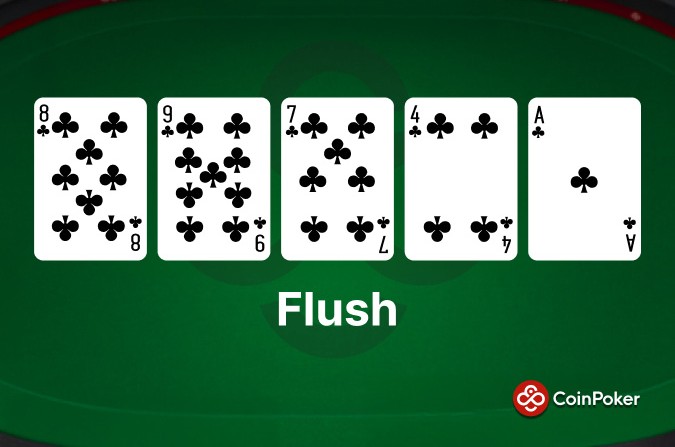
For example, if you hold K♥ 9♥ + 7♥ 4♥ 3♥, and your opponent has A♥ 10♥ + 7♥ 4♥ 3♥, their Flush would win because the Ace is higher than your King. So even though both hands are Flushes, the one with the highest top card wins. Suited connectors often make flushes, but risk being beaten by higher flushes.
In Texas Hold’em, the odds of getting this hand are 1 in 508, provided the hand goes all the way to the river.
| Stage of the Game | Texas Hold’em Odds | Omaha Odds |
| Odds of Hitting a Flush on the Flop | 0.82% (1 in 122) | 1.55% (1 in 64) |
Straight (9♠ 8♣ 7♦ 6♥ 5♠)
A Straight in poker is made up of five consecutive cards of different suits (e.g., 9♠ 8♣ 7♦ 6♥ 5♠). A Straight can include multiple cards of the same suit, and any mix of suits has the same value. A Straight is a strong poker hand, as it beats any Three-of-a-Kind, Two Pair, or One Pair. However, it can also lose to hands like Flushes, Full Houses, Quads, or higher Straights.
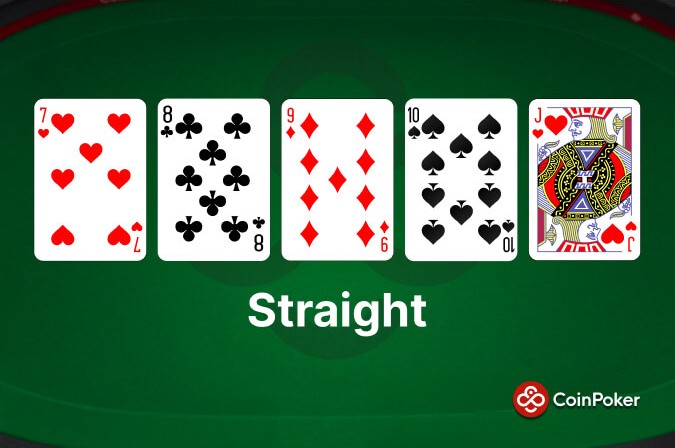
If two Straights go up against each other, the higher straight wins. For example, your 9♠ 8♣ 7♦ 6♥ 5♠ wins against your opponent’s 7♦ 6♠ 5♥ 4♠ 3♦. If two players have the same Straight, they chop the pot up, regardless of the suits of their cards.
In Texas Hold’em, you will make a straight in one of every 254 hands if you go all the way to the river.
| Stage of the Game | Texas Hold’em Odds | Omaha Odds |
| Odds of Hitting a Straight on the Flop | 1.31% (1 in 76) | 2.11% (1 in 47) |
Three-of-a-Kind (7♠ 7♣ 7♦ K♣ J♠)
Three-of-a-Kind is a poker hand made up of three cards of the same ranking, along with two other cards that act as kickers. For example, if you have 7♠ 7♣ 7♦ K♣ J♠, you hold Three-of-a-Kind. This hand can be made in two ways. When made with two hole cards and one community card, the hand is called a Set. When made with one hole card and two community cards, the hand is called Trips.
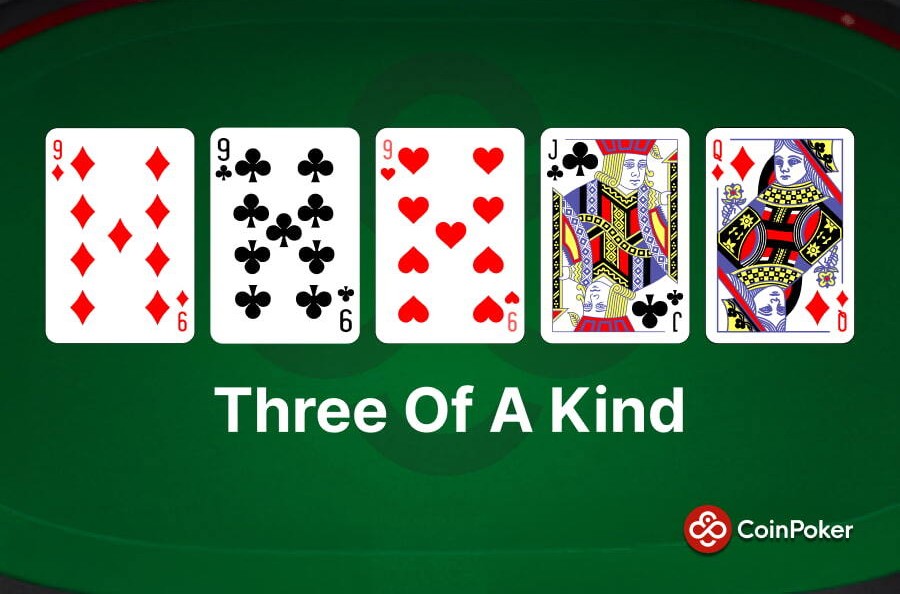
Whether you have a Set or Trips, you will beat any Two Pair or One Pair combo but lose to any Straight, Flush, or higher. If two players have the same Three-of-a-Kind hand, the tie is decided by comparing kickers. A higher Three-of-a-Kind beats a lower one in every case.
In Texas Hold’em, the odds of being dealt Three of a Kind are 1 in 46 when all cards are taken into consideration.
| Stage of the Game | Texas Hold’em Odds | Omaha Odds |
| Odds of Hitting Three of a Kind on the Flop | 11.8% (1 in 8) | 15.35% (1 in 6.5) |
Two Pair (Q♠ Q♣ 5♥ 5♠ A♥)
The next hand in our poker hand rankings is Two Pair, made up of two pairs of cards of the same ranking. For example, Q♠ Q♣ 5♥ 5♠ A♥ makes for two pair Queens and Fives, with an Ace kicker. Two Pair beats any One Pair or High Card, but loses to any Three-of-a-Kind, Straight, Flush, or higher.
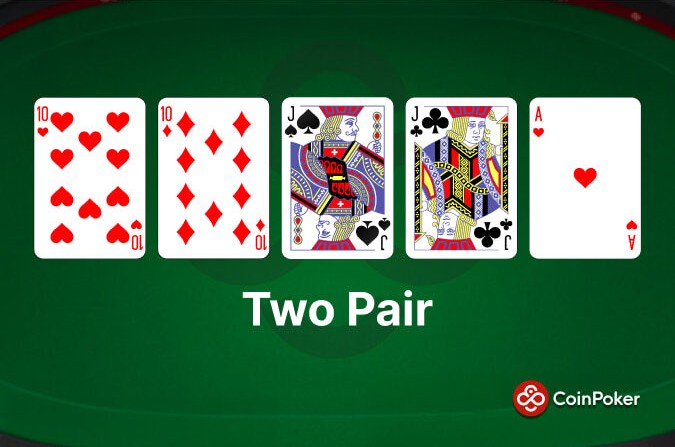
If Two Pair goes up against another Two Pair, the player with the highest top pair wins. For example, your Q♠ Q♣ 5♥ 5♠ A♥ loses to K♣ K♥ 2♠ 2♣ 5♦, but wins against J♠ J♥ T♥ T♣ A♦, since your Queens are lower than Kings, but higher than Jacks. If two players have the same Two Pair, the kicker is used to break the tie.
In Texas Hold’em, the chances of having Two Pair by the river are 1 in 21.
| Stage of the Game | Texas Hold’em Odds | Omaha Odds |
| Odds of Hitting Two Pair on the Flop | 16.1% (1 in 6.2) | 23.5% (1 in 4.2) |
One Pair (A♠ A♣ K♦ T♠ 7♦)
One Pair is the lowest “made hand” in poker, built with two cards of the same ranking. For example, A♠ A♣ K♦ T♠ 7♦ makes for One Pair of Aces with a King kicker. One Pair is a very common poker hand that only beats other One Pair hands and High Card hands, while losing to any Two Pair, Three-of-a-Kind, or higher-ranked hand. You’ll sometimes start poker games with a pair, by being dealt pocket pairs.
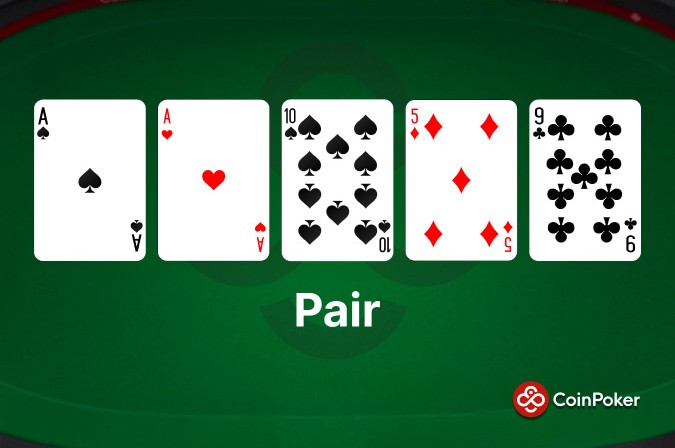
One Pair going up against another One Pair is a very common scenario in poker. In these situations, the higher-ranked One Pair generally wins the hand. However, if two players have the same One Pair hand, the players’ kickers decide who takes down the pot.
In Texas Hold’em, you will have One Pair in 1 of ever 2. 37 hands that go to showdown.
| Stage of the Game | Texas Hold’em Odds | Omaha Odds |
| Odds of Hitting One Pair on the Flop | 29% (1 in 3.4) | 43% (1 in 2.3) |
High Card (A♠ K♥ T♠ 7♥ 4♣)
A High Card is the lowest hand on the poker hand rankings chart, made up of five cards that don’t make any pairs, straights, or flushes. A High Card loses to any made hand, and can only beat another High Card hand.
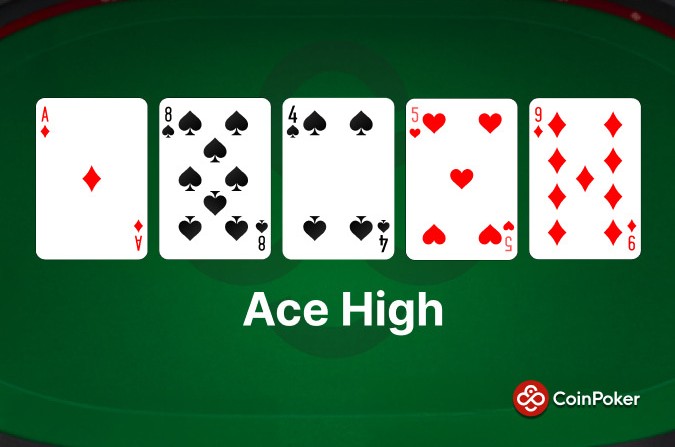
If two High Card hands to go up against each other, the one with the highest card wins. For example, a player holding A♠ 4♣ beats a player holding K♠ Q♥, simply because the Ace is higher than a King. If the top card is the same, the next best card is used to break the tie. This keeps going until one player has a higher card in their hand to win the pot.
The High Card is the most common poker hand, with 1 in 1.99 poker hands ending as a High Hand by showdown.
| Stage of the Game | Texas Hold’em Odds | Omaha Odds |
| Odds of Ending Up with a High Card on the Flop | 48% (1 in 2.1) | 34% (1 in 2.9) |
Poker Hand Absolute Value vs. Relative Value
The absolute value of the hand, as seen in the poker hand rankings chart, determines its value compared to other poker hands in a vacuum. For example, a Full House is one of the stronger hands in poker, and its absolute value is quite high.
However, when playing poker, you will often care more about the relative value of your hand. The relative value refers to the value of your hand relative to the board. For example, if the board is J♠ J♥ 7♠ 7♥ K♣, and you have A♣ 7♣, your relative hand strength is not that high. Yes, you do have a Full House, but your opponent could easily have a higher Full House with any hand containing a Jack.
Make sure to consider your relative hand strength when playing poker. Don’t get married to a Flush or a Full House simply because their absolute hand strength is high. Consider the board and evaluate your relative hand strength.
Is One Suit Ranked Higher Than Other Suits?
In most situations in poker, each suit has the exact same value. Suits don’t help determine the winner of the hand in any situation in Texas Hold’em Poker. There are a few rare situations where suits do matter, such as when determining the dealer button. In this case, the ranking of suits is Spades, Hearts, Diamonds, and Clubs, from highest to lowest.
There are some variations of poker, some of which are rarely played these days, in which suits played a much bigger role. However, in games like Texas Hold’em and Pot Limit Omaha, suits serve a mostly decorative purpose and don’t have much value of their own.
Poker Hand Odds
Poker is played with a deck of 52 cards, and each starting hand combination gives you a chance of making various poker hands. Depending on your hole cards, the odds of making strong poker hands like Straights, Flushes, and Quads change quite a bit.
Knowing the poker odds and probabilities of making certain types of poker hands can be quite beneficial when you are making the decisions in-game. The table below gives you some insight into how likely you are to make the strongest poker hands with different starting card combinations:
| Hand | Odds to Make on Flop | Odds to Make on Turn | Odds to Make on Turn or River | |
| Royal Flush | A♣K♣ | 0.005% | ~2% | ~4% |
| Straight Flush | 8♣9♣ | 0.02% | ~4% (Open-ended draw) | ~8% (Open ended draw) |
| Four of a Kind | A♠A♥ | 0.24% | ~1% (Three of a kind) | ~2% (Three of a kind) |
| Full House | K♦K♠ | 0.98% | ~18% (Set) | ~30% (Set) |
| Flush | K♥Q♥ | 0.8% | ~18% (Flush draw) | ~36% (Flush draw) |
| Straight | 8♠7♣ | 1.3% | ~16% (Open-ended draw) | ~32% (Open-ended draw) |
| Three of a Kind | 9♣9♦ | 11.8% | ~4% (One pair) | ~8% (One pair) |
| Two Pair | J♥T♠ | 2% | ~6% (One pair) | ~12% (One pair) |
| One Pair | A♦Q♥ | 29% | ~12% (High Card) | ~24% (High card) |
Keep in mind that poker odds change quite significantly when playing Pot Limit Omaha. Starting with four instead of two hole cards makes all the difference, which is why absolute hand strength of each hand goes down in value when playing PLO.
Texas Hold’em vs. Omaha: Hand Odds
In Texas Hold’em, you receive two hole cards, while in Omaha, you’re dealt four. This extra set of cards in PLO gives you more possibilities to hit a strong hand. For example, the odds of hitting a Flush or Straight are better in Omaha because you have more potential combinations. If you’re holding suited connectors in Hold’em, the chances of hitting a Flush on the flop are about 0.82%, but in Omaha, those odds nearly double.
While Texas Hold’em hand rankings and Omaha hand rankings are technically the same, hands tend to have more absolute value in NLH.
Learn What Beats What in Poker Hand Rankings
Now that you know the basic poker hand rankings, you are ready to start playing poker. CoinPoker offers a variety of freeroll tournaments and low-stakes poker games where you can practice your skills and hone in on hand rankings and other basics of the game. Make sure to check out our guide on what beats what in poker as well to make sure you haven’t missed anything.
Once you are ready, head over and sign up with CoinPoker to start playing in real poker games and making use of the poker knowledge you have gained.
FAQs
Texas Hold’em Poker hands are ranked in order from strongest to weakest as follows: Royal Flush, Straight Flush, Four-of-a-Kind, Full House, Flush, Straight, Three-of-a-Kind, Two Pair, One Pair, High Card.
The best hand is a Royal Flush.
There are ten official poker hand rankings.
A Four of a Kind, Straight Flush, and Royal Flush.
Yes, the odds are different due to the number of hole cards dealt.
Yes, when more than one hand has a flush, the hand with the highest card in the flush wins.
Explore More
Announcements
Read recent announcements from CoinPoker about new games, ambassadors, and changes to our platform.
1 PostGuides
The go-to resource for mastering poker with expert tips and strategies. Our guides will elevate your poker skill level.
60 PostsNews
Find the latest poker news and latest CoinPoker Newsletters. Get updates about games, promotions, and crypto news.
96 PostsPromotions
Find the latest coinpoker promotions here. Explore the crypto poker world with the best poker promotions available.
1 Post
















